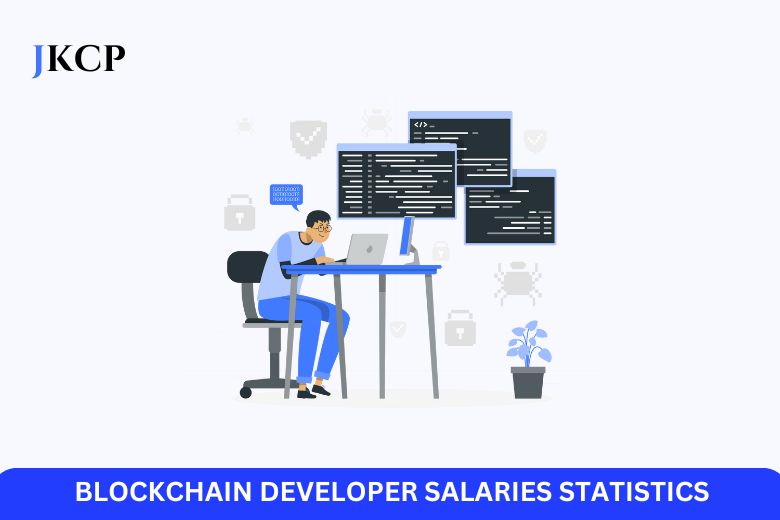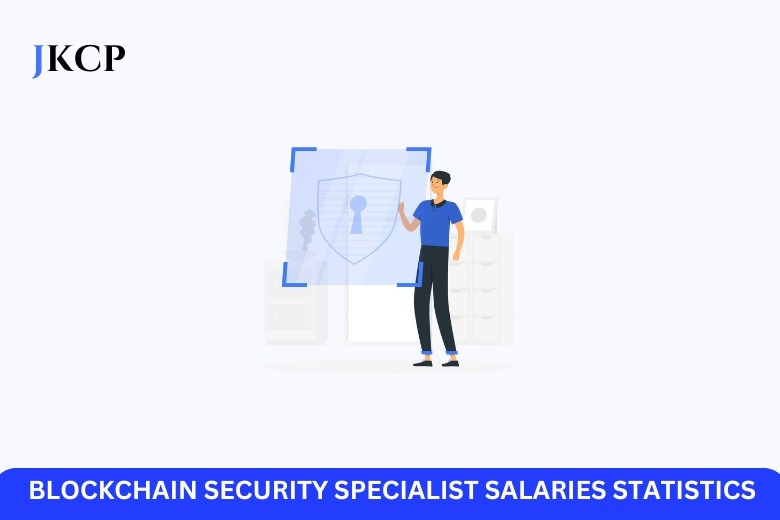What Is a Blockchain Professional and How to Become One?
Back in my late school years, when thinking about who I wanted to be when I grew up, the idea of becoming a blockchain specialist did not cross my mind. It is not because I am ancient, but mostly because the term is relatively new and was not widely known when I graduated. Now I know that the area offers some great opportunities and work in this sphere.
Blockchain is frequently associated just with Bitcoin and other cryptocurrencies. Nowadays, however, blockchain is used in many other areas, including gaming, financial back-office operations, healthcare, etc. Plus, according to Statista, the blockchain technology market will likely grow to nearly 1000 trillion US dollars by 2032. This means that the demand for specialists in blockchain will continue to rise. So, if you are still thinking about whether to become a blockchain specialist, keep on reading.
Blockchain Explained
In simple words, blockchain is a sophisticated database that constantly grows, while being shared among many computers. Data in it is stored in a chain of blocks, giving the technology its name, with each subsequent block containing a timestamp of the previous one. Changing the data in any of the blocks that are distributed over many computers is extremely difficult. This is because altering anything in one record means changing the data in all the following blocks as well.
Since I want to go into slightly more detail, I should also mention how the information is managed in a blockchain. It is commonly presented in a so-called distributed ledger, which is a database stored simultaneously in many places around the world. Computers (nodes) participating in the tasks usually form a peer-to-peer (P2P) network, which I think, is a pretty awesome way of doing things. Let me explain: there is no single administrator on the network, and each of the nodes updates itself independently. The system is also secure, using cryptography to protect its data and making it nearly impossible to hack.
With all of the above, it is not surprising that many businesses want to benefit from the use of blockchain technology. I also noticed that there are many nicely paid jobs advertised for blockchain experts, to meet the market demands. So, what is a blockchain professional?
Who Is a Blockchain Professional?
A block chain professional is an expert in blockchain technology, but their specific roles can differ. The family of blockchain specialists include blockchain engineers, blockchain developers, data analysts, consultants etc. There is no doubt that you would require a good knowledge of blockchain for any of the jobs in this industry.
Blockchain specialists are in high demand now, with probably the most frequently advertised jobs for blockchain developers. They typically need to bring in some coding experience. There is a difference between, for instance, a blockchain developer and a blockchain engineer, with the latter being more network-oriented rather than focusing on a specific application development.
Why Become a Blockchain Professional?
There are a few simple arguments why I would strongly recommend becoming a blockchain expert. First of all, the market for this technology is growing rapidly, which means that more jobs will appear and need to be filled.
Then, I would be attracted to the salaries offered to blockchain professionals across the board; they are some of the highest compared to many other technical fields. But it is not just the money that is important. It is also a chance to be part of an exciting innovative concept in many types of industries, not limited to just cryptocurrencies.
Finally, blockchain could offer specialists long-term job security as the technology advances. If I were you, I would consider boosting my expertise in blockchain.
Skills Required From a Blockchain Professional
What does the industry require from a blockchain expert to succeed? It appears that blockchain is a too complex technology for many technical specialists, but with the right set of skills, you will be flying through it. Some of the essential expertise includes programming skills, knowledge of cryptography, data management, and soft skills, of course. Let’s take a closer look at the skills required to be a blockchain expert.
Programming
Knowing how to code is mandatory for many technical specialists in blockchain. Some experience in any front-end development is usually needed. But most importantly, advantageous is the familiarity with object-oriented programming. Typical programming languages used in blockchain are Python, C++, Solidity, Go, Ruby, Java, and JavaScript. I would also make sure I know how smart contracts work and how to design them since this is a very promising concept already in action in different spheres.
Cryptography and Cybersecurity
Cryptography, which encompasses ways of coding data from the general public into a form that is readable by limited parties, is one of the key features that helps ensure the security of blockchain. Hence, specialists bringing their knowledge into the field are particularly valued. Several types of cryptography are used in blockchain, so the more of them you know, the better.
Cybersecurity overall is another very important foundation of blockchain. Knowing how security protocols work and how to make sure they function correctly is a great skill for any blockchain professional.
Data and Network Management
Blockchain is all about data and the way data is stored on the network. You should be familiar with a range of data structures and architectures. Blockchain uses four types of networks: public, private, consortium, and hybrid. While the most commonly used is probably public architecture, blockchain specialists will increasingly work in other environments as well.
Soft Skills
Like many other jobs, the role of a blockchain specialist will not do without soft skills. A particularly important one is problem-solving, which you can master with practice taken from everyday life or other jobs. Communication and collaboration skills, as well as the ability to successfully work in a team, will give someone wondering about how to become a blockchain professional a clear advantage compared to others.
What Does a Blockchain Developer Do?
Firstly, let’s clarify: what is a blockchain developer exactly? In short, a blockchain developer’s role belongs to the big family of blockchain specialists. The position is set to design and maintain blockchain applications. Let’s take a closer look at the different areas and tasks a blockchain developer would typically work with.
Applications (dApps) Development
It is pretty much inevitable that if you start working as a blockchain developer, you will be working on decentralized applications (dApps) that work for blockchains. You will likely be doing a lot of front-end work in one or multiple programming languages. Expect any product you are working on to be innovative and hence sometimes challenging to navigate. Involvement in technical documentation as you develop an application is usually essential.
Smart Contracts
DApps use smart contracts to work effectively. Smart contracts also need development as they are pieces of code or a chain of protocols that execute automatically at certain points in time. Their function is to set rules within the network operation and to reduce manual administrative work. The most common language for writing smart contracts is probably Solidity, which is based on Python, C++, and JavaScript. If you were thinking about how to become a blockchain developer, I would start by learning Solidity.
Testing and Project Management
Not unlike in other development jobs, quality assurance and extensive testing are key to seeing that the application is performing as required. A blockchain developer will be expected to work closely with testers and fix any errors as they are discovered. The role is also expected to collaborate with cross-functional teams and work on multiple projects. Hence, good project and time management expertise will be of huge benefit.
How Much Does a Blockchain Developer Earn?
According to Technopedia, blockchain developer is the third top-earning role among blockchain experts, following the higher executives and the investment fund specialists. In terms of earning at an entry-level, blockchain developer gets one of the highest salaries, making this role my favorite.
This is likely due to a high demand for blockchain experts. As per Glassdoor, the average entry-level salary for a blockchain developer is around 117,000 US dollars per year. This number would be pretty convincing if I chose the industry and was interested in the field right now.
How to Become a Blockchain Developer?
With all the key requirements for getting your foot in the door of blockchain, it might seem challenging to approach the area. I assure you, it is just a skill like all the others. With the right training and certifications, you would quickly learn how to become a blockchain professional. There are several ways to get exposed to blockchain development, with the three most promising ones: classical university degrees, bootcamps/hackatons, and independent certification courses.
University Degrees
University courses, while certainly providing a solid learning base, are a long-term path towards blockchain. For example, Harvard, Berkeley, and Zurich University currently offer undergraduate programmes in blockchain, so if you have time on your hands to study, research what college near you runs such a curriculum. Some universities offer postgraduate opportunities or shorter-term blockchain courses, which might be another option for you.
Once-Off Events (Bootcamps/Hacktons)
Bootcamps or hackathons may be great for those looking to dig into the practical bits of blockchain before becoming blockchain professionals. You join a team to work with during a set time and get to experience the simulation of a real blockchain industry case scenario to solve. To note, these events usually do not give you a piece of paper afterwards that says that you are now a blockchain developer. Plus, if you have not gotten that convincing coding experience just yet or do not want to wait for the next event to take place, the next option might suit you better.
Blockchain Сertification
Independent blockchain certification courses commonly target those people who want to learn about blockchain quickly. There are various certifications to choose from, but I would personally be looking to get a widely recognized one. So what is a certified blockchain professional? It is an expert with a widely accepted blockchain certification, such as for instance, Certified Blockchain Developer (CBD), Certified Blockchain Architect (CBA), Certified Ethereum Developer (CED), Certified Solidity Developer (CSD), or else.
Final Thoughts
To summarize, the role of a blockchain expert offers an exciting and promising opportunity to have a consistent career in an innovative area. There are various roles needed in the area, with the most demand for blockchain developers. If you were wondering about how to become a blockchain developer, I hope that this article was of help to you.



